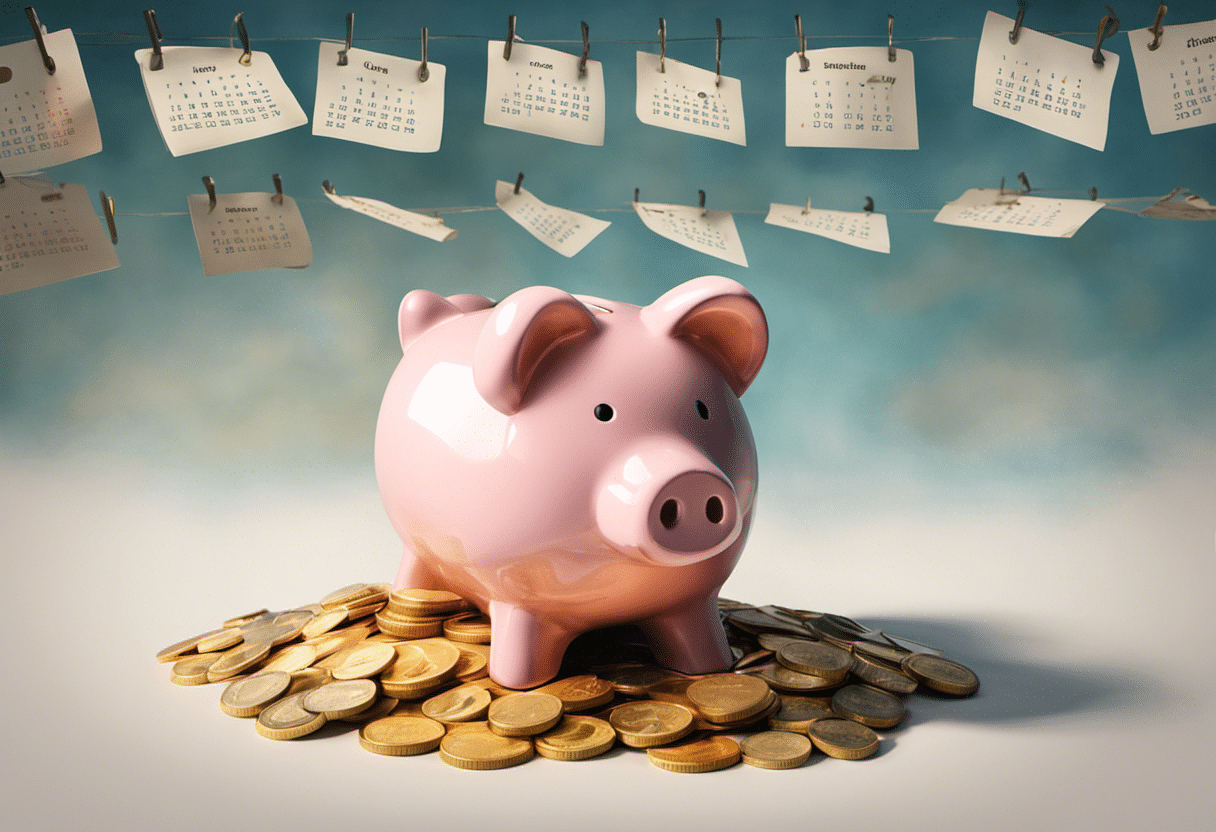Imagine this scenario: you come home after a long day, only to find your water heater has sprung a leak. Panic sets in as you realize the costly repairs that lie ahead.
But wait! What if I told you there was a way to ease the burden of unexpected expenses? That’s right, every household needs an emergency fund.
In this article, we’ll explore why having one is crucial, how to start building it, and the benefits it can provide during times of crisis.
So buckle up and get ready to take control of your financial future!
Key Takeaways
- An emergency fund acts as a financial safety net and provides peace of mind by covering unexpected expenses and reducing stress.
- It helps prevent the need to sell valuable possessions and ensures that you can handle life’s curveballs.
- Saving a small amount each month is better than nothing, and it is important to prioritize saving over non-essential purchases.
- The recommended size of an emergency fund is three to six months’ worth of living expenses, and it should be kept in easily accessible and liquid accounts.
The Importance of Having an Emergency Fund

Having an emergency fund is crucial for any household. Think of it as your financial safety net, always ready to catch you when unexpected expenses come flying at you like a flock of seagulls fighting over a bag of chips. Life is full of surprises, and not all of them are pleasant. Your car might break down, your washing machine might decide to go on strike, or maybe your beloved pet needs an urgent trip to the vet (don’t worry, Fido will be fine). These things happen, and having an emergency fund means you won’t have to panic and sell your collection of rare Pokémon cards just to cover the costs.
But wait! There’s more! An emergency fund also gives you peace of mind. It’s like having a superhero cape tucked away in your closet; you know it’s there if you ever need it. No more tossing and turning at night worrying about how you’ll handle life’s unexpected curveballs. With an emergency fund in place, you can sleep soundly knowing that whatever comes your way, financially speaking, you’ve got this.
Now that we’ve established the importance of having an emergency fund in your life (seriously, it’s like having a magical money genie), let’s talk about how to start building one without breaking the bank or resorting to extreme couponing techniques.
How to Start Building an Emergency Fund

To start building your emergency fund, you should begin by setting aside a small portion of your income each month. Think of it as putting money into your own personal piggy bank for those unexpected rainy days.
You might be wondering how much to save. Well, that depends on your situation and comfort level, but experts generally recommend saving at least three to six months’ worth of living expenses.
Now, I know what you’re thinking: ‘But what if I can’t afford to set aside money every month?’ Trust me, I get it. Life is full of unexpected expenses and it can be tough to make ends meet sometimes. However, even if you can only save a little bit each month, it’s better than nothing at all. Every dollar counts when it comes to building your emergency fund.
Common Financial Emergencies and the Role of an Emergency Fund
Now let’s talk about the common financial emergencies you might face and how your emergency fund can help you through them. Life is full of surprises, both good and bad. And when a financial curveball comes your way, having an emergency fund can be a total game-changer. So, what kind of emergencies are we talking about here? Let me break it down for you in this handy table:
| Common Financial Emergencies | How Your Emergency Fund Can Help |
|---|---|
| Medical expenses | Cover unexpected medical bills |
| Car repairs | Pay for necessary repairs |
| Job loss | Cover essential living expenses |
| Home repairs | Take care of unexpected repairs |
See how having that safety net can make all the difference? Whether it’s a sudden illness or a broken-down car, your emergency fund is there to save the day. It allows you to handle these unforeseen expenses without falling into debt or stressing out about money.
And speaking of that emergency fund, now that you know why it’s important, let’s move on to strategies to maintain and grow it. Because let’s face it, emergencies don’t wait around for us to be prepared.
Strategies to Maintain and Grow Your Emergency Fund
Let’s take a look at some effective strategies for maintaining and growing your emergency fund.
You’ve already taken the first step by starting an emergency fund, so congratulations! Now it’s time to make sure it keeps growing and stays strong.
One strategy is to set up automatic transfers from your checking account to your emergency fund every month. By doing this, you’ll be consistently saving without even thinking about it.
Another great strategy is to cut back on unnecessary expenses. Do you really need that daily latte or those weekly takeout meals? By making small sacrifices now, you can contribute more money towards your emergency fund.
Additionally, consider finding ways to earn extra income, such as taking on a side gig or selling unused items online. Remember, every little bit counts!
Lastly, regularly review and adjust your budget to ensure that you’re allocating enough funds towards your emergency savings. With these strategies in place, your emergency fund will continue to grow and provide you with peace of mind.
Now that you have some effective strategies for maintaining and growing your emergency fund, let’s dive into the benefits of having an emergency fund in times of crisis.
Benefits of Having an Emergency Fund in Times of Crisis

Having an emergency fund in times of crisis provides a sense of security and peace of mind. Picture this: you’re walking down the street, minding your own business, when suddenly, a piano falls from above! Now, I’m not saying that pianos falling from the sky is a common occurrence (thank goodness), but life has its fair share of unexpected events. That’s where your trusty emergency fund comes in. It’s like having a superhero cape tucked away for those moments when life throws you a curveball.
Imagine being able to handle any financial setback without breaking into a cold sweat or resorting to drastic measures like selling all your furniture on Craigslist. With an emergency fund at your disposal, you can face unexpected medical bills, car repairs, or even sudden job loss with confidence. No more tossing and turning at night, worrying about how you’ll make ends meet.
But wait – there’s more! Having an emergency fund not only provides financial stability but also empowers you to make better decisions in times of crisis. You won’t have to settle for just any job that comes along because you’re desperate for money. Instead, you can take the time to find a position that aligns with your goals and values.
So my friend, don’t underestimate the power of having an emergency fund. It’s like having a secret weapon against life’s uncertainties – one that brings peace of mind and allows you to tackle any challenge with grace and ease. Start building yours today!
Frequently Asked Questions
Can I Use My Emergency Fund for Non-Financial Emergencies?
Sure, you can use your emergency fund for non-financial emergencies. It’s there to help you when unexpected things pop up, like fixing a broken appliance or dealing with a car breakdown.
How Much Money Should I Have in My Emergency Fund?
How much money should you have in your emergency fund? It depends on factors like your income, expenses, and risk tolerance. Consider asking yourself: What amount would give me peace of mind during unexpected events?
Is It Better to Keep My Emergency Fund in a Savings Account or Invest It?
Investing your emergency fund may seem tempting, but it’s best to keep it in a savings account. That way, you have quick and easy access to the money when unexpected expenses arise. Safety first!
What Are Some Alternative Options to Building an Emergency Fund?
Want alternatives to building an emergency fund? How about a magical piggy bank that grants wishes or a secret stash of money hidden under your pillow? Just kidding! Stick to traditional methods like savings accounts or investments.
Are There Any Tax Implications for Using Funds From an Emergency Fund?
Using funds from your emergency fund may have tax implications. Consult a tax professional to understand the specific rules and regulations that apply to your situation. Stay informed to make informed decisions!
Conclusion
So there you have it, my friend! You now know why having an emergency fund is absolutely crucial for every household.
It’s like having a magical shield that protects you from financial disasters. Whether it’s a broken-down car or unexpected medical bills, your emergency fund will swoop in to save the day!
So go ahead and start building your fortress of financial security. Trust me, you’ll thank yourself when life throws those curveballs at you.
Stay prepared and stay awesome!

